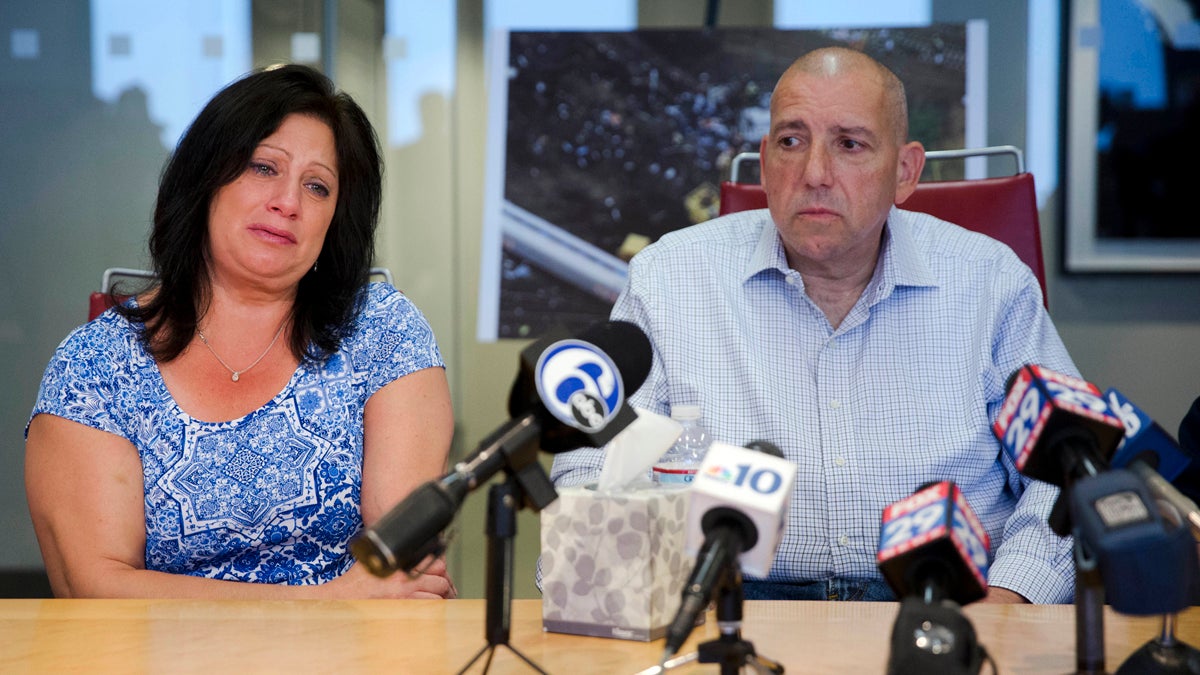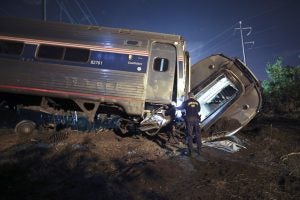Physical, emotional pain torments Amtrak 188 survivor one year after derailment
Today marks one year since a speeding Amtrak train derailed in Port Richmond, killing eight people and injuring more than 200

Amtrak crash survivor Robert Hewett, right, listens to his wife, Judy, speak during during a news conference, Thursday, May 12, 2016, in Philadelphia. Thursday marks the one year anniversary of the fatal derailment. (Matt Rourke/AP Photo)
Today marks one year since a speeding Amtrak train derailed in Port Richmond, killing eight people and injuring more than 200. New Jersy resident Bob Hewett says he can’t forget.
Today marks one year since a speeding Amtrak train derailed in Port Richmond, killing eight people and injuring more than 200.
Brandon Bostian, the engineer driving the train that night, has repeatedly told investigators he can’t remember many details, including why he steered the locomotive into a curve at 106 mph, twice the speed limit, a catastrophic move that sent the seven-car train into its deadly tumble off the tracks.
But Bob Hewett can’t forget.
Hewett was riding in the first car, the one most damaged in the derailment.
He remembers the train speeding up, his car hurtling off the tracks, and his body flying through the air, into luggage racks, other seats, the ceiling, another passenger. He remembers coming to on a pile of rocks, unable to move and terrified, as he saw flames erupt in wreckage nearby. He remembers the urgency in the voice of one first-responder, who shined his flashlight on Hewett’s mangled body and urged his colleagues to hurry and help: “This guy’s gotta go now! The whole back of his head’s coming off!”
Hewett, 58, a father of three from Nutley, N.J., visited Philadelphia today to attend a private memorial at the crash site in hopes of connecting with those first-responders who responded so quickly that Hewett was the first survivor to arrive at Hahnemann University Hospital that night. (He was also the last to leave, spending seven weeks in the hospital, followed by a month at a New Jersey rehabilitation center.)

He talked to reporters today at the Center City office of attorney Robert Mongeluzzi, who represents Hewett and several other victims of the Amtrak 188 crash. The Hewetts don’t know the identities of the first-responders who carried him to safety and have just a blurry photo of nameless men hauling him toward the red lights of emergency vehicles.
“I’m just here to hopefully say thanks,” said Hewett, his voice still halting and wheezy from his injuries, which included a collapsed lung and fractures to more than 20 ribs, his hip, and spine.
“I want to say thank you. I don’t know what else to say. I’m just very grateful,” he said, crying.
His wife Judy added, “He was so close to death, his injuries — this was a fight for weeks to keep him alive and get him well … I almost became a widow, and my kids almost lost their father that night.”
The cause of the crash remains undetermined, although National Transportation Safety Board investigators have focused on human error and ruled out mechanical, signal and track issues. The NTSB will meet in Washington, D.C., Tuesday to determine a probable cause.
Sarah E. Feinberg, who heads the Federal Railroad Administration, issued a statement today marking the crash’s one-year anniversary: “If it is possible for anything positive to emerge from the wreckage of Amtrak 188, it is that the incident continues to serve as a constant reminder, and as a call to action, to implement every available safety technology and policy to prevent future derailments.”
While Positive Train Control is now active on the Northeast Corridor, it has yet to be implemented on many other rail lines nationally, Feinberg said. Transit agencies also must continue other safety enhancements, including addressing crew fatigue and distraction and researching how to design train cars so passengers are better-protected in the event of a crash, she added.
Hewett, a security executive before the crash, hasn’t been back to work since. His life now is a blur of medical appointments and aches both physical and emotional.
“I have pain 24/7. I have trouble breathing. My kidneys were so badly damaged in the crash that I see a nephrologist every three months. I was on dialysis for 10 weeks [after the crash],” he said. “I have a 15-month-old granddaughter, and I can’t even hold her. I can’t even play with her.”
He sees a psychologist for post-traumatic stress disorder. Nightmares still disrupt his sleep many nights, and uncertainties — like the fate of the other passenger he hit head-on as the train rolled — torment him.
“That’s one of the things that haunts me. I wonder did he live or die? Did me hitting him kill him? Hurt him? Was he dead when he hit me? I don’t know. It bothers me,” said Hewett, who has scars that stretch like a spiderweb across his close-shorn head.
He doesn’t understand why police haven’t charged Bostian with a crime. A Philadelphia police investigation into whether criminal charges are warranted remains ongoing, a spokesman confirmed today.
“I don’t see it any different than vehicular manslaughter,” Hewett said. “His actions took eight lives, and dozens, hundreds, others were impacted by it. Every breath I take, I’m impacted by it.”
WHYY is your source for fact-based, in-depth journalism and information. As a nonprofit organization, we rely on financial support from readers like you. Please give today.



